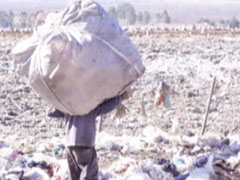Broadband / modem
Published: March 2007
Silvia Andrade led a good life in Argentina. A well-educated woman from a middle–class family, Andrade was the owner of a Buenos Aires freight company. Things changed for Andrade and others as the economically fragile country, saddled by foreign aid debt, quadruple–digit inflation, and political instability, slid into a recession in the 1990s. In December 2001, Argentina experienced the worst economic crisis in its history, a meltdown caused by the resignation of its president, a 70 percent devaluation of the Argentine peso, and a jobless rate of more than 21 percent.
Andrade, then in her early forties and a divorced mother of young children, lost her business and became a cartonera, scavenger. With 40,000 others, she eked out a living by selling paper and cardboard discarded on city streets to recycling companies. Collectively, cartoneros gathered 450 to 900 tons of garbage a day.
Her story is one of many in the documentary film Cartoneros, directed by Ernesto Livon-Grosman, associate professor of Hispanic studies and a native of Argentina. During a visit to his homeland in 2001, Livon–Grossman was moved by “all these people combing the city for garbage” and decided to make a film recording the phenomenon. Over the next three years, he shot more than 60 hours of film.
Already invited to a half-dozen festivals throughout the country, the film was first screened at the University on March 15 as part of the “Writers Among Us” series, which features the creative work of faculty. The series is sponsored by Boston College Magazine and the Office of the Provost. @BC presents the first 12 minutes of the hour–long documentary, which is Livon–Grossman’s first film. Cartoneros will be shown next at the Finger Lake Film Festival in late March. To learn more about future screenings, please visit: www.cartonerosdoc.com

